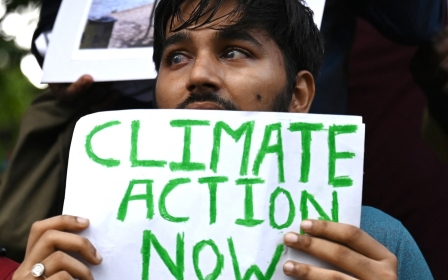Climate change: Half of youth in Middle East and North Africa reconsider having kids

Nearly half of young people in the Middle East and North Africa have reconsidered having children because of climate change, according to the United Nations’ children’s agency.
According to a global poll conducted on behalf of Unicef, 44 percent of youth in the region say the impacts of climate change have made them think twice about starting a family - the highest rate of concern in the world. Young people in sub-Saharan Africa followed close behind, with 43 percent.
Young people in both regions said they had experienced several climate shocks that have had impacts on income and access to food and water.
The poll, which was conducted using 243,512 respondents worldwide, was released to coincide with the Cop27 climate talks currently being held in Egypt’s Sharm el-Sheikh.
“The impacts of climate change are with us now, but they are far more than floods, droughts, and heatwaves. They extend to our very sense of hope,” said Paloma Escudero, head of Unicef’s Cop27 delegation.
Escudero urged nations converging in Sharm el-Sheikh to take notice of the poll and take action.
'World leaders must listen to this anxiety from young people and take immediate action to protect them'
- Paloma Escudero, head of Unicef’s Cop27 delegation
“Especially in Africa, young people are seeing the impact these shocks are having on themselves and those they love, and it is changing their plans for the future. But it doesn’t have to. At Cop27, world leaders must listen to this anxiety from young people and take immediate action to protect them,” she said.
In the Middle East and North Africa, 31 percent of respondents said they had less food to eat because of climate change, and 34 percent said their family’s income source had been hit.
Meanwhile, 35 percent of youth in the region said they were finding it increasingly difficult to access clean water, and 70 percent said they have considered moving to another country or city because of the effects of climate change.
The Middle East and North Africa are some of the regions most at risk from climate change. Increased aridity, increased temperatures, reduced precipitation, and rising sea levels affect every country along the coast of North Africa.
And climate catastrophes in the Middle East are likely to increase in severity and frequency, according to a recent study by the International Monetary Fund.
The Cop27 climate conference began on Sunday in the Egyptian Red Sea resort town of Sharm el-Sheikh. It takes place amid a backdrop of major natural disasters across the world, including devastating floods in Pakistan that affected more than 30 million people, and severe drought in the Horn of Africa.
“There is a lot of talk about policy decisions, but that is not what is at stake here at Cop27,” Escudero said.
“This survey makes it clear young people’s futures are up in the air - whether they have children, whether they leave their countries, how well they survive the dangers they face.
"For their sake, success at Cop27 must be measured by the delivery of long-promised financing to help communities adapt and the development of solutions to respond to loss and damage,” she said.
This article is available in French on Middle East Eye French edition.
Middle East Eye propose une couverture et une analyse indépendantes et incomparables du Moyen-Orient, de l’Afrique du Nord et d’autres régions du monde. Pour en savoir plus sur la reprise de ce contenu et les frais qui s’appliquent, veuillez remplir ce formulaire [en anglais]. Pour en savoir plus sur MEE, cliquez ici [en anglais].




